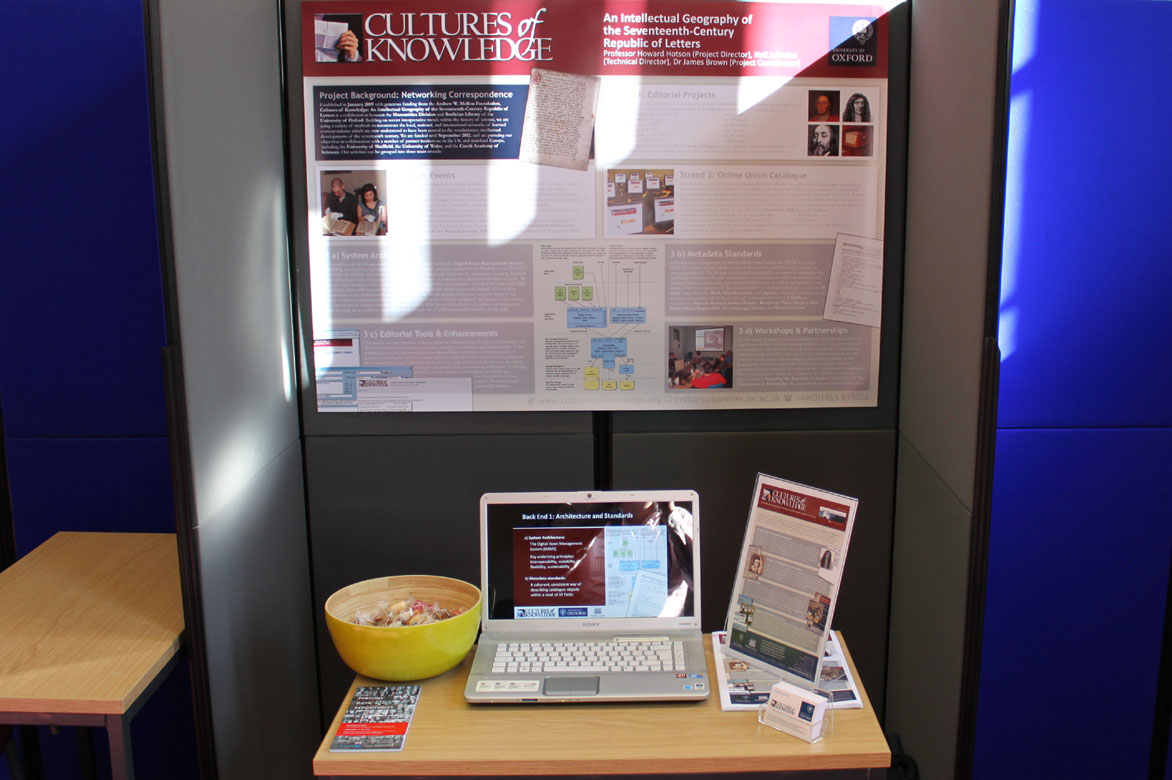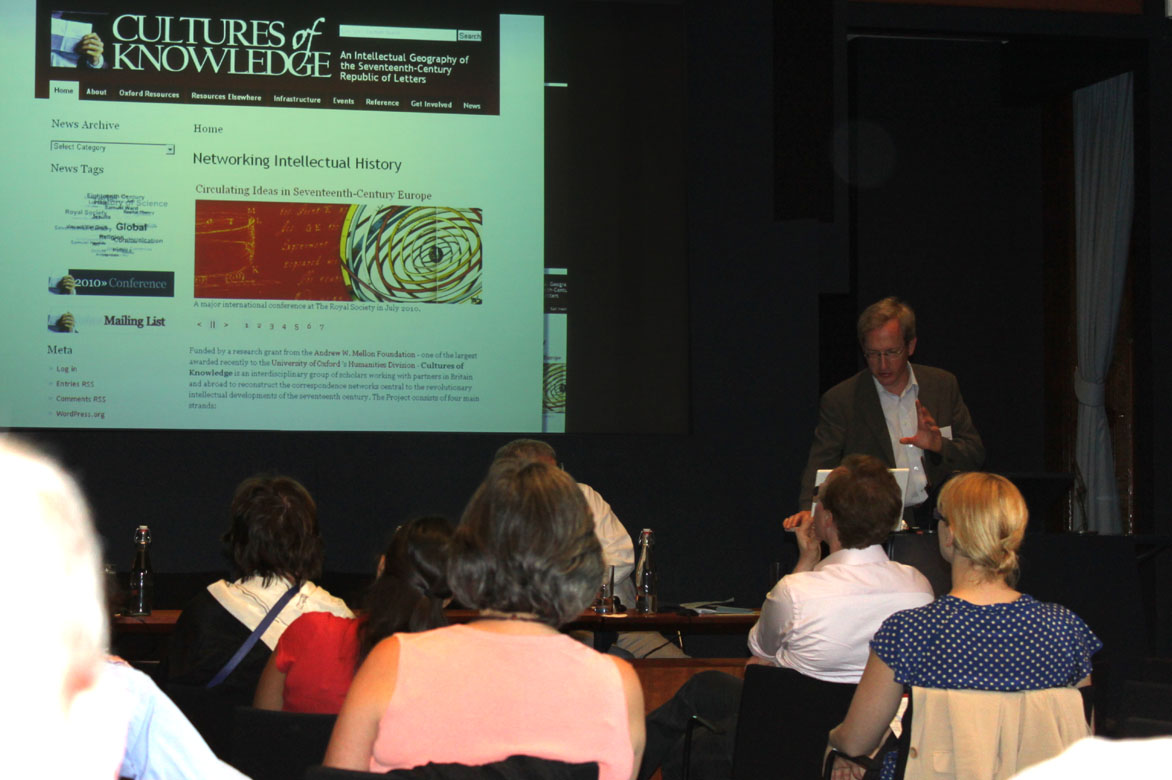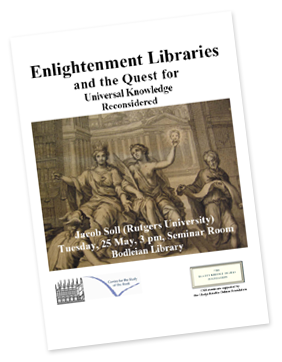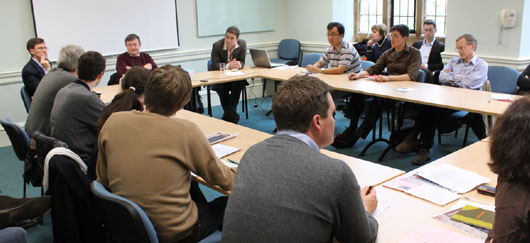* You are viewing Posts Tagged ‘Europe’
James Brown
July 14, 2010
Conferences and Workshops, Events, Project Updates
Tags: Communication, Databases, Digitization, Europe, History of Science, Networks, Royal Society, Samuel Hartlib, Seventeenth Century, Union Catalogue

Our poster and stand at DH2010.

Presenting at the Royal Society.
Cultures of Knowledge headed to London last weekend as the Project Director and Coordinator braved thirty-degree metropolitan temperatures to share the Project’s research at two events. At Digital Humanities 2010, the flagship annual meeting of the digital humanities community hosted this year by King’s College London, we presented a poster, which focused mainly on our union catalogue and its technical underpinnings. We received very useful feedback and discovered and made connections with some highly complementary projects, including the initiative discussed below. Meanwhile, at the kind invitation of our collaborator Mark Greengrass, Howard Hotson co-delivered a keynote address at Circulating Ideas in Seventeenth-Century Europe: Networks, Knowledge, and Forms, a conference at the Royal Society organised by Ruth Connolly (University of Newcastle), Felicity Henderson (Royal Society), and Carol Pal (Bennington College). Building on Mark’s overview of Hartlib’s significance as an intelligencer and the trials and tribulations of the Hartlib Papers Project, Howard used a description of the place of Hartlib and his letters within Cultures of Knowledge as the basis for a more general overview of the Project and its aspirations, especially within the digital sphere.
Download the poster presented at DH2010
James Brown
June 23, 2010
Events, Lectures, Project Updates
Tags: Digitization, Europe, France, Isaac Casaubon, Joseph Justus Scaliger, Low Countries, Richard Thomson, Seventeenth Century
In the seventh and penultimate installment of the Project’s seminar series on Thursday 10 June, a large audience enjoyed papers by Dr Dirk van Miert (Huygens Institute) and Dr Paul Botley (Warburg Institute), both postdoctoral fellows on the Scaliger Correspondence Project, established by Professor Anthony Grafton. In his opening contribution, van Miert explored ‘The Seventeenth-Century Culture of Editing Scholarly Correspondences: The Case of Joseph Scaliger’. Via a fascinating case study of several early seventeenth-century editions of the correspondence of the French scholar (especially that prepared by Daniel Heinsius), he argued that in an early instance of the ‘institutionalisation’ of the Republic of Letters it was increasingly common for lavish printed editions of the correspondence of intellectuals to appear during or immediately after their lifetimes, often prepared by former students (Heinsius studied under Scaliger). In his concluding contribution, Botley switched the focus to two less high-profile denizens of the Republic of Letters in a paper entitled ‘The Letters of Isaac Casaubon (1559–1614) and Richard Thomson (c.1570–1613)’. Botley described his attempts to bring Casaubon’s c.2400 surviving letters (254 exchanged with Scaliger) to a wider scholarly audience by means of a definitive online edition, and introduced us to the letters of the little-known philologist and Church of England clergyman Richard Thomson, a regular correspondent of both Scaliger and Casaubon. Seminars take place in the Faculty of History on George Street on Thursdays at 3pm. For past seminars in the series, please see here.
 Podcast now available on the seminar page!
Podcast now available on the seminar page!
 A lecture by Jacob Soll on ‘Enlightenment Libraries and the Quest for Universal Knowledge Reconsidered’ will take place at 3pm on Tuesday 25 May in the Seminar Room of the New Bodleian Library. Soll gained his doctorate in history at Cambridge University after completing a diploma of advanced studies at the École des Hautes Études en Sciences Sociales in Paris. His 2005 book, Publishing The Prince, about the afterlife and translations of Machiavelli’s work, won the Jacques Barzun Prize in Cultural History. Since then he has written about the birth of information culture in Europe, including research on the origins of state archives, on note-taking by early modern readers, on accountancy in seventeenth-century Holland, and the critical uses of historical evidence in early modern Europe. In 2009 he published The Information Master: Jean-Baptiste Colbert’s Secret State Intelligence System. Soll teaches at Rutgers University, New Jersey. He is a Consulting Editor of the Journal of the History of Ideas and a co-founder and Associate Editor of the new online journal Republics of Letters, founded at Stanford University with Dan Edelstein.
A lecture by Jacob Soll on ‘Enlightenment Libraries and the Quest for Universal Knowledge Reconsidered’ will take place at 3pm on Tuesday 25 May in the Seminar Room of the New Bodleian Library. Soll gained his doctorate in history at Cambridge University after completing a diploma of advanced studies at the École des Hautes Études en Sciences Sociales in Paris. His 2005 book, Publishing The Prince, about the afterlife and translations of Machiavelli’s work, won the Jacques Barzun Prize in Cultural History. Since then he has written about the birth of information culture in Europe, including research on the origins of state archives, on note-taking by early modern readers, on accountancy in seventeenth-century Holland, and the critical uses of historical evidence in early modern Europe. In 2009 he published The Information Master: Jean-Baptiste Colbert’s Secret State Intelligence System. Soll teaches at Rutgers University, New Jersey. He is a Consulting Editor of the Journal of the History of Ideas and a co-founder and Associate Editor of the new online journal Republics of Letters, founded at Stanford University with Dan Edelstein.

Dr Noël Golvers answers questions following his talk.
In the opening paper of the Project’s seminar series on Thursday 29 April, Dr Noël Golvers (Catholic University of Leuven) provided a large audience with a fascinating overview of the contours, chronology, and thematic preoccupations of ‘Scholarly Correspondence from the Jesuits in China with Europe (17th–18th Centuries)’. In a wide-ranging analysis, Golvers argued for the strategic importance of a large, well-regulated correspondence network to this administratively complex and geographically distributed community, a network which frequently and increasingly sustained communication on scientific matters alongside confessional and organizational subjects (previously used by Golvers to shed light on Jesuit contributions to astronomy and mathematics). He provided an overview of the characteristics of the correspondence generated by the China mission, information on transfer routes (both overseas and overland), and a synopsis of the broad range of learned topics they covered, especially from the 1680s (including mathematics, astronomy, engineering, and cartography). He also considered the impact of the letters on contemporary European readers, as well as their descent to and organisation within modern archives and collections. Overall, the paper provided fresh insights into both a particular epistolary culture of knowledge, and a neglected source for seventeenth-century European and world history more generally. Seminars take place in the Faculty of History on George Street on Thursdays at 3pm. For future seminars in the series, please see here.
 Podcast now available on the seminar page!
Podcast now available on the seminar page!






 Join
Join 